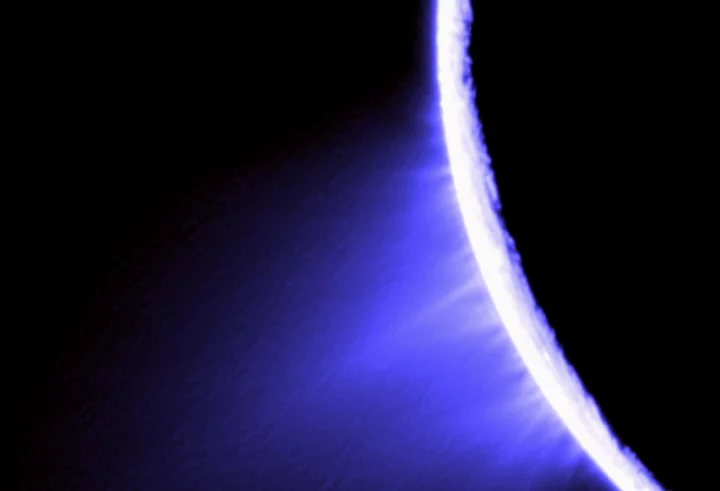Major finding on Saturn moon boosts hope for finding alien life nearby
Phosphates have been found on Saturn’s moon Enceladus, in a new breakthrough discovery that boosts hopes for finding alien life in our solar system. It is the first time phosphorus has been found in an ocean beyond those on Earth, and marks a major development in our understanding of other ocean worlds. Enceladus is one of the most likely hopes for finding nearby extraterrestrial life. While its outside is wrapped in an ice crust, underneath is a global ocean that could be a home for alien life. Some of that ocean spews up and out of the surface of Enceladus, in the form of vast plumes. Scientists have been able to examine those plumes to better understand the ocean itself, including in the new study. Researchers in the latest study used data from the Cassini mission – which flew around Saturn and Enceladus – to find out what the oceans are made up of. They not only found phosphorus, but data suggested that it could be there are concentrations at least 100 times higher than in Earth’s oceans. What’s more, modelling based on the new data suggests the same could be true for other ocean worlds, potentially boosting the chances of alien life there, too. Phosphorus is not in itself evidence of life. But on Earth, the presence of phosphorus compounds in water are crucial for biological activity, and so it is a key part of evaluating whether a distant world might support life. The work is described in a new paper, ‘Detection of phosphates originating from Enceladus’s ocean’, published in Nature. The breakthrough is just the latest in a series of findings from Enceladus. Recently, scientists found that the moon’s plumes were particularly vast, shooting out 20 times the length of the planet itself and with enough water to fill an olympic swimming pool in a couple of hours. Unlike the new phosphorus findings, which relied on the Cassini spacecraft sent by Nasa to Saturn, that work was conducted by the James Webb Space Telescope, which scientists hope will allow us to understand the distant moon in much more detail. Read More Watch: Strawberry moon lights up skies over UK Nasa invites public to sign ‘message in a bottle’ that will fly to Jupiter’s moon Watch as astronauts step out of ISS for latest spacewalk

Phosphates have been found on Saturn’s moon Enceladus, in a new breakthrough discovery that boosts hopes for finding alien life in our solar system.
It is the first time phosphorus has been found in an ocean beyond those on Earth, and marks a major development in our understanding of other ocean worlds.
Enceladus is one of the most likely hopes for finding nearby extraterrestrial life. While its outside is wrapped in an ice crust, underneath is a global ocean that could be a home for alien life.
Some of that ocean spews up and out of the surface of Enceladus, in the form of vast plumes. Scientists have been able to examine those plumes to better understand the ocean itself, including in the new study.
Researchers in the latest study used data from the Cassini mission – which flew around Saturn and Enceladus – to find out what the oceans are made up of.
They not only found phosphorus, but data suggested that it could be there are concentrations at least 100 times higher than in Earth’s oceans.
What’s more, modelling based on the new data suggests the same could be true for other ocean worlds, potentially boosting the chances of alien life there, too.
Phosphorus is not in itself evidence of life. But on Earth, the presence of phosphorus compounds in water are crucial for biological activity, and so it is a key part of evaluating whether a distant world might support life.
The work is described in a new paper, ‘Detection of phosphates originating from Enceladus’s ocean’, published in Nature.
The breakthrough is just the latest in a series of findings from Enceladus. Recently, scientists found that the moon’s plumes were particularly vast, shooting out 20 times the length of the planet itself and with enough water to fill an olympic swimming pool in a couple of hours.
Unlike the new phosphorus findings, which relied on the Cassini spacecraft sent by Nasa to Saturn, that work was conducted by the James Webb Space Telescope, which scientists hope will allow us to understand the distant moon in much more detail.
Read More
Watch: Strawberry moon lights up skies over UK
Nasa invites public to sign ‘message in a bottle’ that will fly to Jupiter’s moon
Watch as astronauts step out of ISS for latest spacewalk









